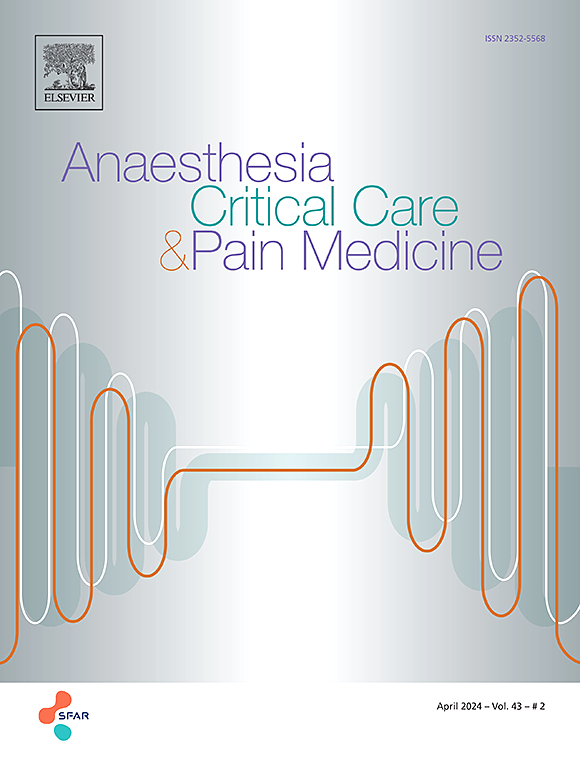The prevalence and trajectory of frailty in older surgical patients: A longitudinal multicentre cohort study
IF 4.7
3区 医学
Q1 ANESTHESIOLOGY
引用次数: 0
Abstract
Background
Frailty is a state of increased vulnerability and decreased physiological reserve, which can reduce one’s capacity to cope with external stressors such as a major surgery. We aimed to (1) investigate the preoperative and postoperative prevalence of frailty in older surgical patients; and (2) evaluate preoperative risk factors associated with postoperative frailty.
Methods
This multicentre prospective study included 307 non-cardiac surgical patients aged ≥65 years. Clinical frailty was assessed online using the five-item FRAIL scale (Fatigue, Resistance, Ambulation, Illness, weight-Loss) preoperatively and postoperatively at 30, 90, and 180 days. Trajectories of FRAIL scores were assessed with linear mixed-effects models, stratified by preoperative frailty. Preoperative risk factors associated with frailty at 180 days were explored by logistic regression.
Results
Preoperatively, 36% of patients were robust, 52% were prefrail, and 12% were frail. Frail patients experienced a significant improvement in frailty by 90 and 180 days. Prefrail patients experienced a transient worsening of frailty level with subsequent improvement by 180 days. Robust patients experienced similar worsening in frailty but remained clinically robust, despite a small absolute difference in FRAIL score. Preoperative frailty and functional disability were both associated with greater odds of 180-day frailty (aOR 2.65, 95% CI [1.51, 4.97] and aOR 4.71, 95% CI [1.41, 15.65], respectively).
Conclusions
The prevalence of preoperative prefrailty and frailty was high among older surgical patients. A high preoperative FRAIL score and severe functional disability were associated with greater odds of postoperative 180-day frailty. Preoperative frailty assessment can risk-stratify patients and inform postoperative targets.
Registration
The trial was registered on www.clinicaltrials.gov on April 7, 2021 (NCT04850833).

老年外科患者虚弱的患病率和发展轨迹:一项纵向多中心队列研究。
背景:虚弱是一种脆弱性增加和生理储备减少的状态,它可以降低一个人应对外部压力的能力,如大手术。我们的目的是(1)调查老年外科患者术前和术后的虚弱患病率;(2)评估术前与术后虚弱相关的危险因素。方法:本多中心前瞻性研究纳入307例年龄≥65岁的非心脏手术患者。术前和术后30,90和180天,使用五项虚弱量表(疲劳,抵抗力,行走,疾病,体重减轻)在线评估临床虚弱。虚弱评分的轨迹用线性混合效应模型进行评估,并按术前虚弱程度分层。通过logistic回归分析术前180天虚弱的相关危险因素。结果:术前36%的患者身体健壮,52%的患者体弱,12%的患者体弱。体弱多病的患者在90天和180天内的虚弱程度有显著改善。体弱多病患者经历短暂的衰弱程度恶化,随后在180天内得到改善。健壮的患者在虚弱方面经历了类似的恶化,但临床仍然健壮,尽管虚弱评分有很小的绝对差异。术前虚弱和功能障碍均与180天虚弱的较大几率相关(分别为aOR 2.65, 95% CI[1.51, 4.97]和aOR 4.71, 95% CI[1.41, 15.65])。结论:高龄手术患者术前易患和虚弱的发生率较高。术前虚弱评分高和严重的功能障碍与术后180天虚弱的可能性较大相关。术前虚弱评估可以对患者进行风险分层,并告知术后目标。注册:该试验于2021年4月7日在www.Clinicaltrials: gov上注册(NCT04850833)。
本文章由计算机程序翻译,如有差异,请以英文原文为准。
求助全文
约1分钟内获得全文
求助全文
来源期刊

Anaesthesia Critical Care & Pain Medicine
ANESTHESIOLOGY-
CiteScore
6.70
自引率
5.50%
发文量
150
审稿时长
18 days
期刊介绍:
Anaesthesia, Critical Care & Pain Medicine (formerly Annales Françaises d''Anesthésie et de Réanimation) publishes in English the highest quality original material, both scientific and clinical, on all aspects of anaesthesia, critical care & pain medicine.
 求助内容:
求助内容: 应助结果提醒方式:
应助结果提醒方式:


